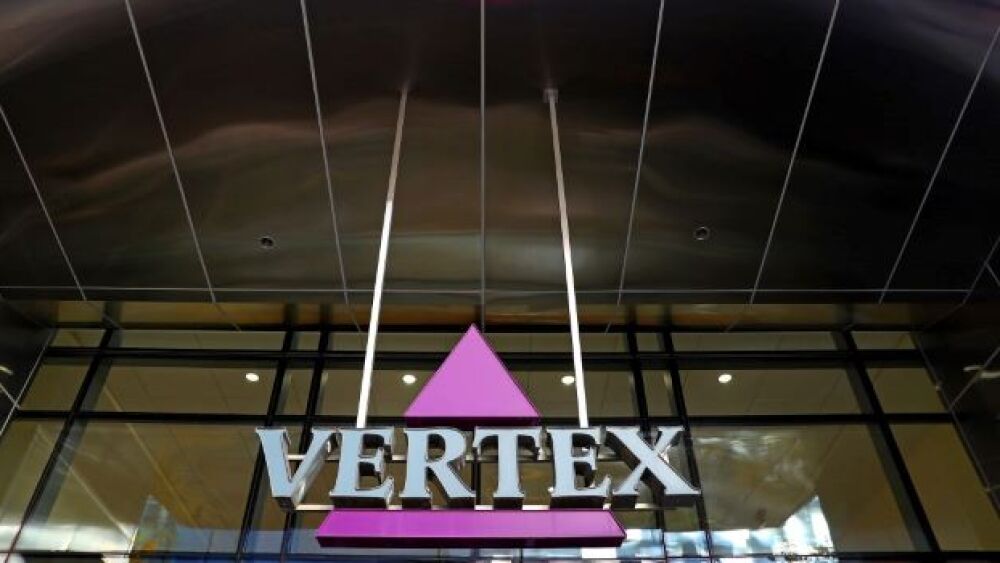The FDA placed a clinical hold on the program due to a determination that there is insufficient information to support dose escalation with the product.
David L. Ryan/The Boston Globe via Getty
Shares of Vertex Pharmaceuticals are falling after the announcement that a clinical hold was placed on its type 1 diabetes treatment VX-880, which previously enabled a man who had been insulin-dependent for decades to begin producing his own insulin. The U.S. Food and Drug Administration placed the hold after expressing concern regarding dose escalation.
This morning, Boston-based Vertex announced the hold as it offered an update on its ongoing Phase I/II study of VX-880, a pancreatic islet cell replacement therapy for patients diagnosed with type 1 diabetes with impaired hypoglycemic awareness and severe hypoglycemia. Vertex said two patients in Part A of the study received the medication at half the target dose. After 270 days, the first patient achieved insulin independence.
The first patient’s results have been highlighted on multiple occasions. Last year, Vertex posted what it called “unprecedented” results for the drug. The patient, Brian Shelton, who had been treated with VX-880 began to produce his own insulin six months after he was infused with the therapy. Shelton had been living with type 1 diabetes for more than 40 years. Prior to enrolling in the Phase I study, it was noted that he was unable to produce his own insulin. Three months after treatment with VX-880, Shelton’s glucose-responsive insulin production had been restored.
The company said the second patient who received a half dose has seen “robust increases in fasting and stimulated C-peptide, and reductions in exogenous insulin requirements” after 150 days.
Following the dosing of the two patients, the Independent Data Monitoring Committee recommended the study advance to the second part, where patients have begun to receive the full target dose of VX-880. The first patient to receive the full dose has been followed for 29 days, the company said.
Vertex noted that across the clinical program, VX-880 has been generally well-tolerated to date with no serious adverse events.
Despite that, the FDA placed a clinical hold on the program due to a determination that there is insufficient information to support dose escalation with the product.
Vertex Chief Medical Officer Carmen Bozic, who is also executive vice president of global medicines development and medical affairs, expressed surprise at the clinical hold. Bozic said the results from the first two patients who were treated with half the target dose established proof of concept. Bozic also said the totality of safety and efficacy data for all three patients dosed so far has provided the company with high confidence in the benefit-risk assessment of VX-880.
Although Vertex is perplexed by the clinical hold, Bozic said the company is committed to working with the FDA to understand and address the agency’s questions so that clinical testing can resume as quickly as possible.
VX-880 is an investigational allogeneic stem cell-derived, fully differentiated, insulin-producing islet cell therapy. The therapy is being assessed as a treatment for patients who have type 1 diabetes with impaired hypoglycemic awareness and severe hypoglycemia. Vertex believes that VX-880 can reestablish the body’s ability to regulate glucose levels by restoring pancreatic islet cell function, which includes glucose-responsive insulin production.
VX-880 was initially developed by Harvard University biologist Doug Melton, who began seeking a potential therapy for his own children who had been diagnosed with diabetes. Last month, Melton joined Vertex to head up its cell therapy research for the disease.
Type 1 diabetes is an autoimmune disease that causes an individual’s pancreas to halt insulin production. It occurs when the body’s immune system attacks and destroys insulin-producing cells in the pancreas, which are known as beta cells. Type 1 diabetes is historically difficult for patients to manage. There are currently no cures or preventative measures for type 1 diabetes.





